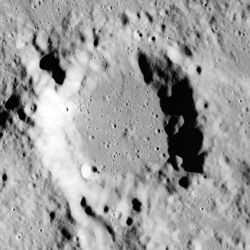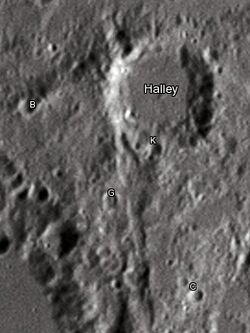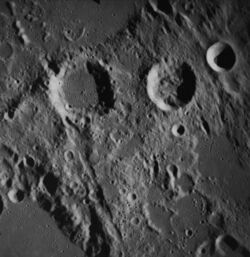Astronomy:Halley (lunar crater)
 Apollo 16 image | |
| Diameter | 35 km |
|---|---|
| Depth | 2.5 km |
| Colongitude | 355° at sunrise |
Halley is a lunar impact crater that is intruding into the southern wall of the walled plain Hipparchus. Its diameter is 35 km. The crater is named after the English astronomer Edmond Halley.[1] On the 1645 map by Michael van Langren, the crater is called Gansii, for the gansa (a kind of wild swan) of Francis Godwin's The Man in the Moone.[2] To the southwest of Halley is the large crater Albategnius, and due east lies the slightly smaller Hind.
The rim of Halley is somewhat worn, the east being scoured by debris from the Imbrium basin, hence forming part of the Imbrium Scultpure. The interior floor of Halley is relatively flat, being filled with material of the same albedo of the surrounding terrain, and is probably melt from the Imbrium impact.
Satellite craters

By convention these features are identified on lunar maps by placing the letter on the side of the crater midpoint that is closest to Halley.
| Halley | Latitude | Longitude | Diameter |
|---|---|---|---|
| B | 8.5° S | 4.5° E | 6 km |
| C | 8.9° S | 6.6° E | 5 km |
| G | 9.1° S | 5.6° E | 5 km |
| K | 8.6° S | 5.9° E | 5 km |
References
- ↑ "Halley (lunar crater)". Gazetteer of Planetary Nomenclature. USGS Astrogeology Research Program.
- ↑ Poole, William (2009), "Introduction", in Poole, William, The Man in the Moone, Broadview, pp. 13–62, ISBN 978-1-55111-896-3
Further reading
- Andersson, L. E.; Whitaker, E. A. (1982). NASA Catalogue of Lunar Nomenclature. NASA RP-1097.
- Bussey, B.; Spudis, P. (2004). The Clementine Atlas of the Moon. New York: Cambridge University Press. ISBN 978-0-521-81528-4.
- Cocks, Elijah E.; Cocks, Josiah C. (1995). Who's Who on the Moon: A Biographical Dictionary of Lunar Nomenclature. Tudor Publishers. ISBN 978-0-936389-27-1. https://archive.org/details/isbn_9780936389271.
- McDowell, Jonathan (July 15, 2007). "Lunar Nomenclature". Jonathan's Space Report. http://host.planet4589.org/astro/lunar/.
- Menzel, D. H.; Minnaert, M.; Levin, B.; Dollfus, A.; Bell, B. (1971). "Report on Lunar Nomenclature by the Working Group of Commission 17 of the IAU". Space Science Reviews 12 (2): 136–186. doi:10.1007/BF00171763. Bibcode: 1971SSRv...12..136M.
- Moore, Patrick (2001). On the Moon. Sterling Publishing Co.. ISBN 978-0-304-35469-6. https://archive.org/details/patrickmooreonmo00patr.
- Price, Fred W. (1988). The Moon Observer's Handbook. Cambridge University Press. ISBN 978-0-521-33500-3.
- Rükl, Antonín (1990). Atlas of the Moon. Kalmbach Books. ISBN 978-0-913135-17-4.
- Webb, Rev. T. W. (1962). Celestial Objects for Common Telescopes (6th revised ed.). Dover. ISBN 978-0-486-20917-3. https://archive.org/details/celestialobjects00webb.
- Whitaker, Ewen A. (1999). Mapping and Naming the Moon. Cambridge University Press. ISBN 978-0-521-62248-6.
- Wlasuk, Peter T. (2000). Observing the Moon. Springer. ISBN 978-1-85233-193-1.
External links
Related article
- Wood, Chuck (May 27, 2007). "Drawings". Lunar Photo of the Day. http://www.lpod.org/?m=20070527.
 |


